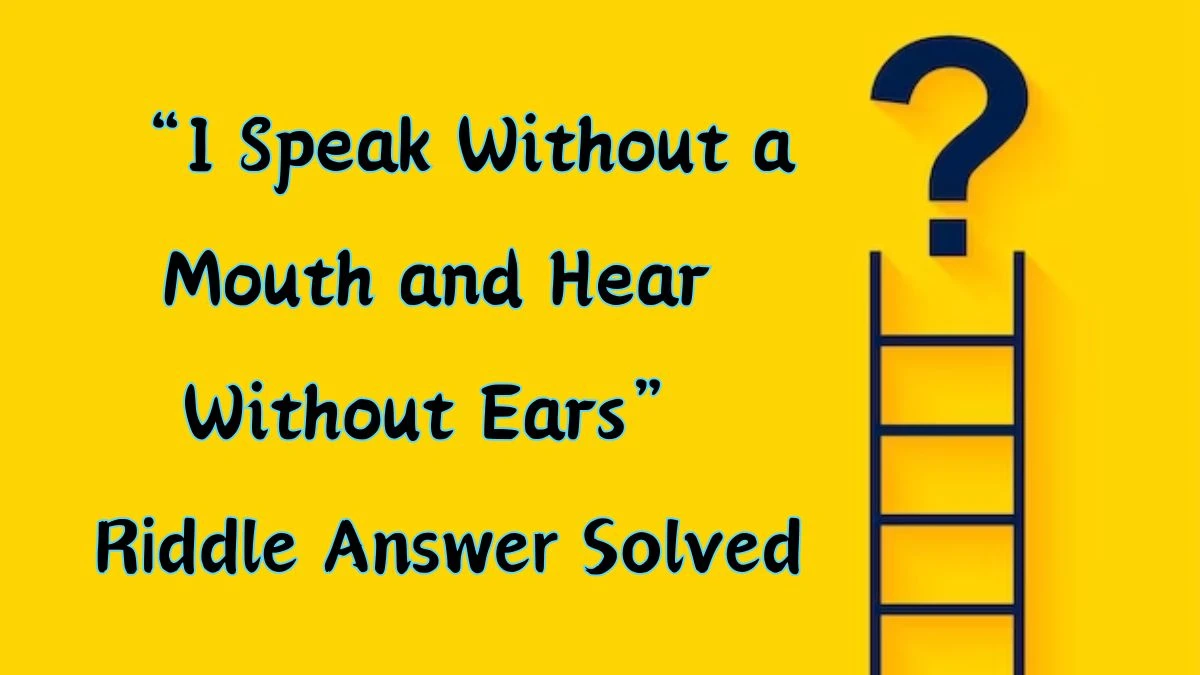- Rojgarlive »
- Riddle »
- I Speak Without a Mouth and Hear Without Ears Riddle Answer Solved
I Speak Without a Mouth and Hear Without Ears Riddle Answer Solved
by Preethi
Updated Feb 05, 2024

"I Speak Without a Mouth and Hear Without Ears" Riddle
Imagine a phenomenon that defies the conventional senses we humans possess. This mysterious entity neither speaks with a mouth nor listens with ears, yet it communicates in its own peculiar way. Picture it without a physical body, an intangible essence lingering in the air. But, here's the twist—it springs to life when the wind comes into play, dancing with the invisible waves and revealing its existence.
The solution lies in the realm of echoes. Yes, an echo is the silent mimicry of sound, bouncing off surfaces and creating a repetitive auditory phenomenon. It doesn't need a mouth to articulate or ears to perceive, yet it springs to life when the wind carries sound waves to reflective surfaces. It's a captivating dance between nature and sound, encapsulated in the subtle magic of echoes.
"I Speak Without a Mouth and Hear Without Ears" Riddle Answer
The answer to this thought-provoking riddle is an echo. Picture this: an echo, a phenomenon that defies the norms of communication. It "speaks" without possessing a mouth and "hears" without the need for ears. It's a ghostly reflection of sound waves, bouncing off surfaces and creating a repeated auditory experience.
Despite lacking a physical body, an echo comes alive when the wind carries sound waves to surfaces that can bounce them back, revealing its mysterious presence in the dance of sound and nature. It's a poetic reminder that communication can take forms beyond the conventional.
"I Speak Without a Mouth and Hear Without Ears" Riddle Answer: An Echo
What is Riddle?
A riddle is like a puzzle wrapped in words, where a statement or question has a sneaky, hidden meaning that you need to uncover. There are two main types: enigmas, which are tricky problems expressed in fancy language, demanding you to think cleverly for the solution, and conundra, which involve playing with words in either the question or the answer. It's like a little linguistic game that challenges your brain.
Imagine it as a universal art form, found in cultures worldwide, each crafting their unique puzzles. Riddles, unlike myths that establish social norms, enjoy teasing the boundaries of ideas, showing that things aren't as straightforward as they seem. They playfully dance with concepts, making us think deeper and, in the end, affirming the importance of those boundaries.
How to Solve a Riddle?
Read Carefully:
Begin by thoroughly reading the riddle. Pay close attention to every word and detail. Sometimes, the solution lies in subtle nuances.
Identify Key Elements:
Identify the key elements or clues in the riddle. Look for words or phrases that might have double meanings or stand out as essential to solving the puzzle.
Think Creatively:
Riddles often require creative thinking. Consider different interpretations of the words and phrases presented. Don't limit yourself to the most obvious meanings.
Consider Wordplay:
Many riddles involve wordplay, such as puns or homophones. Explore whether any words have dual meanings or sound similar to other words that could provide a clue.
Look for Patterns:
Some riddles follow specific patterns or have a consistent theme. If you notice a recurring element or structure, it could be a clue to the solution.
Use Context:
Consider the context of the riddle. Sometimes, understanding the context or background information can lead you to the correct answer.
Test Hypotheses:
Once you have a potential solution in mind, test it against the clues provided in the riddle. Does it fit all the criteria? If not, reassess and try a different approach.
Collaborate:
If you're stumped, discussing the riddle with others can provide new perspectives. Group brainstorming can lead to breakthroughs and shared insights.
Patience is Key:
Solving riddles may take time. Be patient and don't get discouraged. Sometimes, stepping away and returning with fresh eyes can make a difference.
Learn from Solutions:
Whether you solve the riddle or not, take note of the solution. Understanding how the puzzle was crafted can enhance your riddle-solving skills for future challenges.
Riddle Solving Benefits
Thinking Skills:
Solving riddles helps your brain think better. It makes you look at things in different ways and figure out tricky problems.
Problem-Solving:
Riddles are like puzzles. They make you find solutions to challenges, teaching you how to think and solve problems smartly.
Being Creative:
Riddles are like little games for your imagination. They make you think creatively, which is helpful not just in fun stuff but also in subjects like math and science.
Remembering Things:
When you solve riddles, you need to remember details. This helps improve your memory, making it easier for you to remember things in school or in everyday life.
Working Together:
Some riddles are better solved with friends. Figuring them out together helps you work as a team, making you good at working with others.
Feeling Proud:
When you solve a tricky riddle, it feels like you achieved something cool. It boosts your confidence and makes you feel proud of yourself.
Learning New Words:
Riddles introduce you to new words. It's like a fun way to learn and use words you might not have known before.
I Speak Without a Mouth and Hear Without Ears Riddle Answer Solved - FAQs
It describes a mysterious entity that communicates without a mouth or ears, coming alive with the wind.
The solution to the riddle is An echo.
A linguistic puzzle with a hidden meaning or question.
Read carefully, identify clues, think creatively, and consider wordplay.
Improved thinking skills, better problem-solving, enhanced creativity, memory retention, teamwork, and a sense of achievement.




